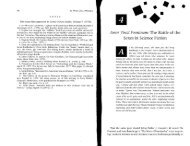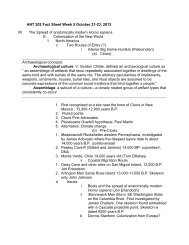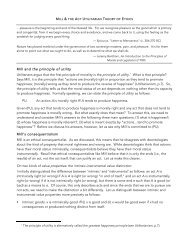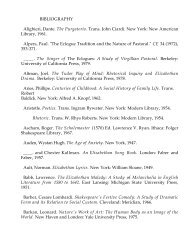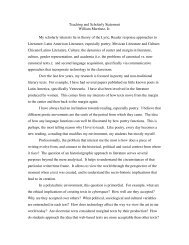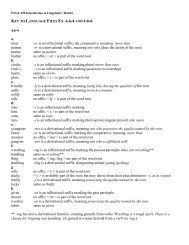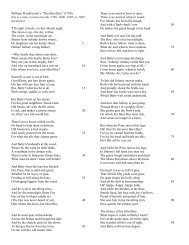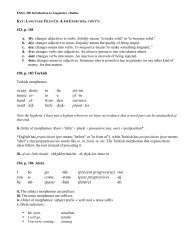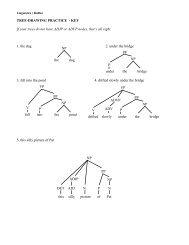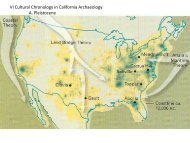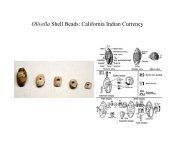On Explaining Existence (Real Possibility as the Key to Actuality)
On Explaining Existence (Real Possibility as the Key to Actuality)
On Explaining Existence (Real Possibility as the Key to Actuality)
Create successful ePaper yourself
Turn your PDF publications into a flip-book with our unique Google optimized e-Paper software.
14 PART ONE: EXISTENCE<br />
all things manifest, possesses an existence of <strong>the</strong><br />
same nature <strong>as</strong> that of <strong>the</strong> definition of <strong>the</strong> circle,<br />
or <strong>as</strong> that of <strong>the</strong> axiom A = A.”<br />
But such a way of addressing <strong>the</strong> problem of ex-<br />
istence is simply <strong>to</strong>o peremp<strong>to</strong>ry. Given that alter-<br />
natives can readily be conceived, how can one<br />
possibly establish necessitarian inevitability? How<br />
could <strong>the</strong> constraints of logic alone possibly engen-<br />
der <strong>the</strong> arrangements of fact? Even <strong>to</strong> consider this<br />
alternative is <strong>to</strong> become persuaded of its unman-<br />
ageability.<br />
7. THE REJECTIONIST APPROACH<br />
Questions like “Why is <strong>the</strong>re anythmg at all?”, “Why<br />
are things-in-general <strong>as</strong> <strong>the</strong>y actually are?”,and<br />
“Why is <strong>the</strong> law structure of <strong>the</strong> world <strong>as</strong> it is?”<br />
cannot be answered within <strong>the</strong> standard causal<br />
framework. For causal explanations need inputs:<br />
<strong>the</strong>y are essentially transformational (ra<strong>the</strong>r than<br />
formational pure and simple). They can address<br />
<strong>the</strong>mselves <strong>to</strong> specific issues dismbutively and seri-<br />
atim, but not collectively and holistically. Ifwe per-<br />
sist in posing <strong>the</strong> sorts of global questions at issue,<br />
we cannot hope <strong>to</strong> resolve <strong>the</strong>m in orthodox causal<br />
terms. Does this mean that such questions are im-<br />
proper?<br />
<strong>On</strong> <strong>the</strong> rejectionist approach, <strong>the</strong> entire ques-<br />
tion of obtaining <strong>the</strong> (or a) re<strong>as</strong>on for <strong>the</strong> existence<br />
of things is simply dismissed <strong>as</strong> illegitimate. Even <strong>to</strong><br />
inquire in<strong>to</strong> <strong>the</strong> existence of <strong>the</strong> entire universe is<br />
held <strong>to</strong> be somehow illegitimate. It is just a mistake<br />
<strong>to</strong> <strong>as</strong>k for a causal explanation of existence pev se;<br />
<strong>the</strong> question should be abandoned <strong>as</strong> improper-<br />
<strong>as</strong> not representing a legitimate issue. We are <strong>as</strong>-<br />
sured that in <strong>the</strong> light of closer scrutiny <strong>the</strong><br />
explana<strong>to</strong>ry “problem” vanishes <strong>as</strong> meaningless.<br />
Dismissal of <strong>the</strong> problem <strong>as</strong> illegitimate is gen-<br />
erally b<strong>as</strong>ed on <strong>the</strong> idea that <strong>the</strong> question at issue<br />
involves an illicit presupposition. It looks <strong>to</strong> an-<br />
swers of <strong>the</strong> form “Zis <strong>the</strong> (or an) explanation for<br />
<strong>the</strong> existence of thmgs.” Committed <strong>to</strong> this re-<br />
sponse-schema, <strong>the</strong> question h<strong>as</strong> <strong>the</strong> <strong>the</strong>sis “There<br />
is a ground for <strong>the</strong> existence of things-existence-<br />
in-general is <strong>the</strong> sort of thing that h<strong>as</strong> an explana-<br />
tion.” And this presumption-we are <strong>to</strong>ld-might<br />
well be false. In principle its falsity could emerge in<br />
two ways:<br />
1. on grounds of deep general principle<br />
inherent in <strong>the</strong> conceptual “logic” of <strong>the</strong><br />
situation; or<br />
2. on grounds of a concrete doctrine of<br />
substantive metaphysics or science that<br />
precludes <strong>the</strong> prospect of an answer-even<br />
<strong>as</strong> quantum <strong>the</strong>ory precludes <strong>the</strong> prospect of<br />
an answer <strong>to</strong> “Why did that a<strong>to</strong>m of<br />
Californium decay at that particular time?”<br />
Let us begin by considering if <strong>the</strong> question of<br />
existence might be invalidated by considerations of<br />
<strong>the</strong> first sort and root in circumstances that lie deep<br />
in <strong>the</strong> conceptual nature of things. Consider <strong>the</strong><br />
following discussion by C. G. Hempel:<br />
Why is <strong>the</strong>re anything at all ra<strong>the</strong>r than nothing? . . .<br />
But mht kind-of-ang-syer-cogd- be appropriate?<br />
What seems <strong>to</strong> be wanted is an explana<strong>to</strong>ry account<br />
which does not <strong>as</strong>sume <strong>the</strong> existence of something or<br />
o<strong>the</strong>r. But such an account, I would submit, is a logical<br />
impossibility. For generally, <strong>the</strong> question “Why is it <strong>the</strong><br />
c<strong>as</strong>e that A?” is answered by “Because B is <strong>the</strong> c<strong>as</strong>e”<br />
. . . [A]n answer <strong>to</strong> our riddle which made no <strong>as</strong>sump-<br />
tions about <strong>the</strong> existence of anytbing cannot possibly pro-<br />
pide adequate grounds. . . . The riddle h<strong>as</strong> been<br />
constructed in a manner that makes an answer logical-<br />
lyimpossible. . . 22<br />
T<br />
But this plausible line of argumentation h<strong>as</strong><br />
shortcomings. The most serious of <strong>the</strong>se is that it<br />
fails <strong>to</strong> distinguish appropriately between <strong>the</strong> existence<br />
of things on <strong>the</strong> one hand and <strong>the</strong> obtaining 1<br />
offacts on <strong>the</strong> 0th~~;~ and supplementarily also between<br />
specifically substantival facts regardmg existing<br />
things, and nonsubstantival facts regardin<br />
states of affairs that are not dependent on <strong>the</strong> operation<br />
of preexisting things.<br />
We are confronted here with a principle of hypostatization<br />
<strong>to</strong> <strong>the</strong> effect that <strong>the</strong> re<strong>as</strong>on for any<br />
thing must ultimately always inhere in <strong>the</strong><br />
operations of things. And at this point we come <strong>to</strong><br />
a prejudice <strong>as</strong> deep-rooted <strong>as</strong> any in Western p<br />
losophy: <strong>the</strong> idea that things c<br />
from things, that nothing can come &om<br />
(ex nihilo nihilfit) in <strong>the</strong> sense that<br />
emerge from a thingless condition.<br />
somewhat ambiguous principle is perfec<br />
lematic when construed <strong>as</strong> saying<br />
tence of something real h<strong>as</strong> a corre<br />
all, <strong>the</strong>n this explanation must pivot on<br />
that is reallv and trulv so. Clearlv. we cannot




